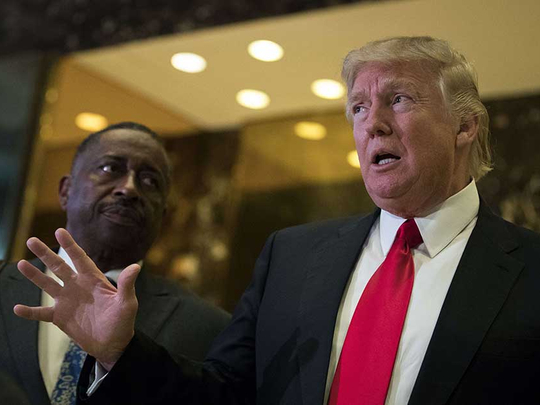
London: European Central Bank (ECB) officials are growing increasingly worried Trump’s victory in the US presidential race may harm the Eurozone by hurting trade with the US and fuelling populism.
Speaking publicly and behind the scenes, officials emphasise any US shift towards protectionism could hurt the already fragile Eurozone economy and pave the way for an even stronger backlash against globalisation and the euro project.
Trump gave little new policy information at a press conference on Wednesday, but his protectionist statements have kept many investors from adding to risky positions. The president-elect has threatened to impose retaliatory tariffs on China, build a wall along the Mexican border and tear up the North American Free Trade Agreement (NAFTA).
Recent data from the Eurozone suggests the bloc’s economy ended 2016 on solid footing, and last month the ECB surprised markets by saying it would trim its monthly bond purchases to 60 billion euros ($63.86 billion, Dh234 billion) starting in April. So none of the economists polled by Reuters this week expect any change at Thursday’s meeting.
Before Trump’s inauguration on Friday, and their next policy announcement on February 1, several Fed policymakers are due to speak, and they are likely to send an upbeat message.
Inflation, industrial production and housing-start numbers are all expected to signal a strengthening economy, giving the Fed scope to follow up December’s rate increase with more tightening this year.
Its Federal Open Market Committee (FOMC) is expected to hike twice more in 2017 and recent comments from policymakers suggest there could be a third move, too.
“The FOMC continues to predict only gradual increases in the federal funds rate, especially given the uncertainty surrounding the economic agenda of Trump’s administration,” Credit Suisse economists told clients.
“We continue to see two additional hikes in 2017, but acknowledge that the outlook is subject to change in months ahead.”
Beginning of Brexit
Britain’s shock decision in June to leave the European Union (EU) has sent sterling tumbling. Although the economy has so far fared better than expected, inflation numbers on Monday will probably show prices jumped in December as imports became more expensive.
Prime Minister Theresa May has said she will trigger Article 50, starting the formal withdrawal from the EU, by the end of March. Many think she will take a hard line on immigration at the cost of Britain’s access to the single market, hindering trade.
“The government has sent clear signals that the UK will leave the Single Market, a so-called ‘hard Brexit’,” said Sarah Hewin at Standard Chartered.
May is due to speak on Tuesday, setting out the approach her administration will take to Brexit. If she does indicate away from a soft Brexit, sterling will probably fall further.












